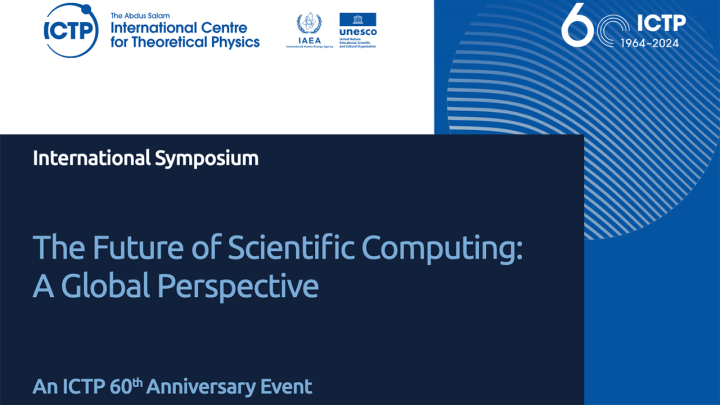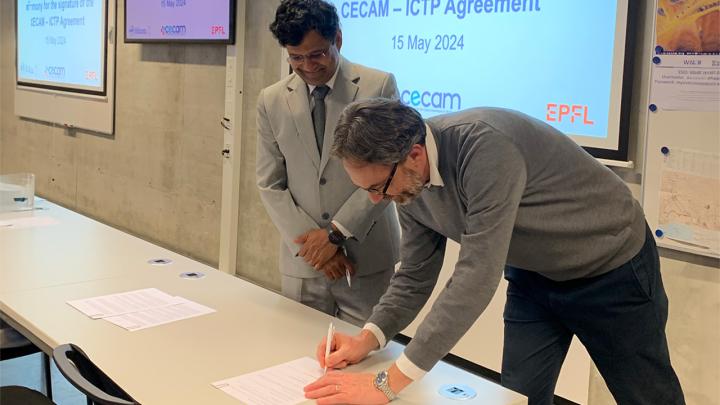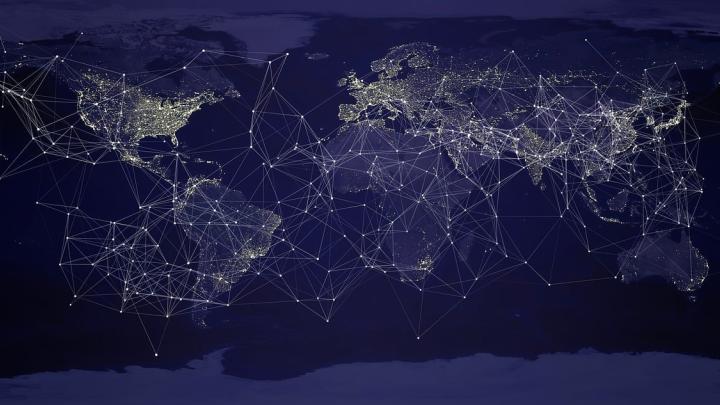
ICTP has announced a new initiative to promote open access to scientific computing resources and the education and training needed to take full advantage of their capabilities. The International Consortium for Scientific Computing (ICOMP) was officially launched during ICTP's International Symposium on the Future of Scientific Computing: A Global Perspective, a 60th anniversary event that attracted leading scientists and technology experts from around the world to discuss the frontiers of scientific computing.
The most powerful supercomputing facilities are expensive and require large amounts of energy to operate, which is why they are concentrated in developed countries. ICOMP's mission is to close the gap between rich and disadvantaged regions of the world in harnessing the potential of computational sciences and making it available to all. It will provide scientists from around the world with an integrated platform to exchange information, access resources, receive training, and contribute to the advancement of the rapidly evolving and expanding research field of computational sciences. ICTP's historical strength in the field of scientific computing, combined with its global scientific network, make it ideally positioned to lead these global efforts.
"The original idea behind the establishment of this consortium is the realization that theoretical physics is no longer what it used to be 30 years ago, when calculations were done with pencil and paper," said Sandro Scandolo, senior coordinator, ICTP Research and Partnerships, and ICOMP coordinator. "Now, I think more than 90% of theoretical physicists, and also mathematicians and related fields, are using computers heavily for their research."
But that requires access to powerful computing resources, as well as a vigilance in keeping abreast with the dynamic development of scientific computing hardware and coding. "Hardware architecture is changing very rapidly, which sometimes forces people to rewrite their codes," Scandolo explained. An added challenge is the development of software algorithms and the use of AI and Machine Learning. "I would have difficulty myself being competitive in my research if I hadn't invested in the knowledge about how to use Machine Learning for my purposes. And again, this is true for almost everybody in theoretical sciences nowadays."
ICOMP aims to address these challenges by building a community of research collaborators, and coordinating free access to some of the most advanced scientific computing facilities in the world, especially for scientists in parts of the world where such access is limited or non-existent. Access to the world's most powerful scientific computing facilities will rely on strategic partnerships; a number of such facilities has expressed strong interest in supporting ICOMP's mission. Meanwhile, ICTP has recently signed an agreement with the Centre Européen de Calcul Atomique et Moléculaire (CECAM) to facilitate access to European high performance computing (HPC) resources for researchers based in Africa.
"Modern and advanced techniques for high-performance scientific computing can enable breakthrough research projects; this, combined with access to high-end computer resources, are both the foundational and the innovative aspects of ICOMP, to ensure that technology is not the limiting factor of scientific progress," said Ivan Girotto, HPC Applications Specialist and a member of the ICOMP working group.
A second crucial aspect of ICOMP's mission is to provide educational and career development opportunities in scientific computing. ICTP's successful joint Master's programme in High Performance Computing (MHPC) will play an important role in this regard. "MHPC alumni are 100% employed, almost equally distributed between world-class research institutes, HPC centres and industry," said Girotto, who is the MHPC co-director.
ICOMP will also coordinate the international, cutting-edge conferences and workshops that ICTP is world-renown for. "It's not enough to give scientists the coding and the big databases, you also need to train them to use those models and those data to address questions that are of relevance for their own countries and regions," explained Scandolo.
These actions aim to build a foundation for advanced scientific computing in developing countries, educating generations of scientists who will be able to perform interdisciplinary research, and producing high-level technical experts who can lead the predicted economic transition. They will be complemented by recent training agreements between ICTP, South Africa and Brazil, extending the impact of the ICOMP initiatives to all corners of the globe.



















